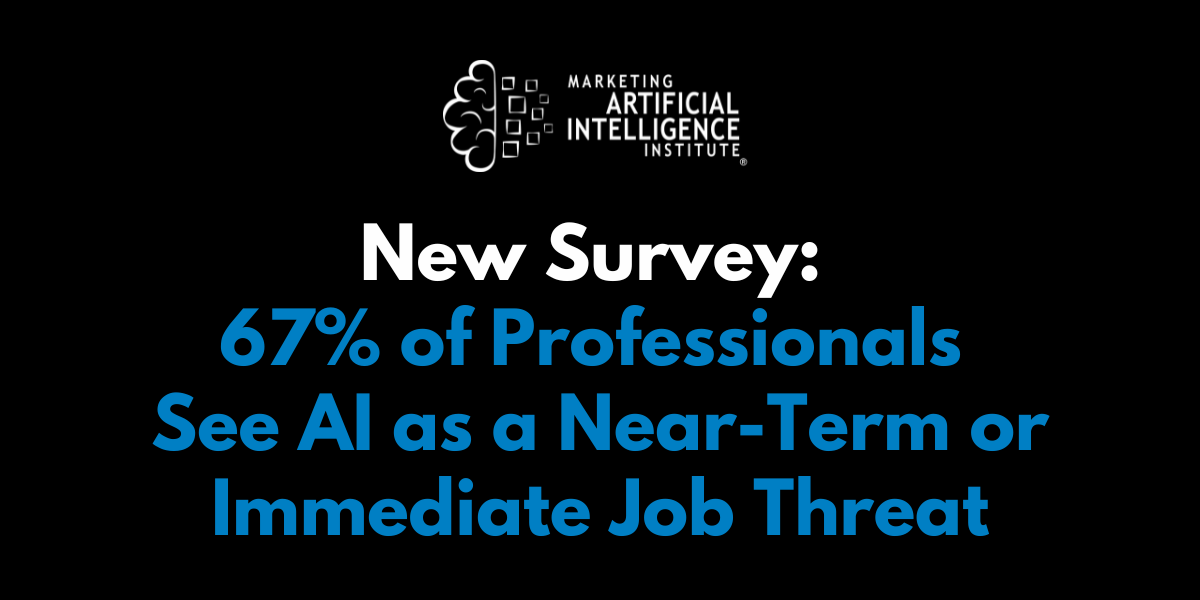Our latest AI Pulse survey, taken by listeners of The Artificial Intelligence Show, shows a significant majority of professionals (two-thirds) view AI as an immediate or near-term career threat, even as they rapidly integrate it into their daily workflows.
According to the date, which polled 115 professionals, a striking paradox is emerging among professionals navigating the AI era. While adoption of AI tools is moving from occasional experimentation to daily habit, this increased familiarity is dramatically increasing, not reducing, anxiety. (Or, at least, going hand-in-hand with it.)
Each week on The Artificial Intelligence Show, we ask our audience to weigh in on key topics via our AI Pulse survey. Data from the latest survey reveals a community deeply engaged with AI but also deeply concerned about its implications for their careers.
The Overwhelming 'Threat' Consensus
When asked about their personal feelings on AI's impact on job security, the audience sentiment was clear and weighted heavily toward concern.
A full 67% of all respondents view AI as a near-term or immediate threat. This breaks down into:
- Nearly 39% see it as a "near-term threat" (a concern for the next 1-2 years).
- And 28% see it as an "immediate threat" (believing it's already causing job displacement).
Only 25% of respondents aligned with the more optimistic view of AI as a "long-term 'rebalancing'" that won't cause a net loss of jobs, and a mere 8% believe it will “create more jobs and value than it disrupts.”

In other words, a clear majority of professionals are already bracing for impact.
AI Is Already a Daily Habit
Here is where the paradox comes in. This anxiety isn't coming from a place of ignorance or fear of the unknown. The survey data shows this audience is composed of sophisticated, hands-on AI users.
A full 92% of respondents are using AI tools regularly. This breaks down into:
- 58% who say AI is a "Habit" that is fully integrated into their daily workflow.
- Nearly 34% who use it on a "Consistent” basis, which means multiple times a week for important tasks.
Only 8% are "Occasional" users, and no one reported using it rarely or not at all.

This isn't a group of professionals watching AI from the sidelines. The vast majority are active, regular users who are leveraging these tools to get their work done. The respondent pool reflects this, with a high concentration of leaders (CEOs, Founders, VPs), marketers, and technical talent (ML Engineers, Software Architects).
Living with the Paradox
This data seems to indicate that the people most worried about AI's impact on jobs are often the same ones using it the most.
It's one small sign that professionals who are "under the hood" of AI every day, using it for content, code, data analysis, and strategy, are the ones who see its disruptive power most clearly.
They have moved past the initial "wow" phase and are now living in the complex, practical reality of AI integration. They see the capabilities, and as a result, nearly two-thirds of people in our audience are connecting those capabilities to real-world threats to their job security, even as they become power users themselves.
This paradox, high adoption coupled with high anxiety, is likely to be the defining dynamic for organizations and their talent over the next several years. The question is no longer if professionals will use AI, but how they and their leaders will manage the profound rebalancing it may produce in the larger economy.
Mike Kaput
As Chief Content Officer, Mike Kaput uses content marketing, marketing strategy, and marketing technology to grow and scale traffic, leads, and revenue for Marketing AI Institute. Mike is the co-author of Marketing Artificial Intelligence: AI, Marketing and the Future of Business (Matt Holt Books, 2022). See Mike's full bio.


